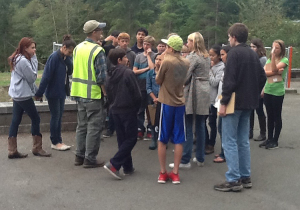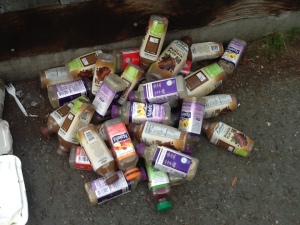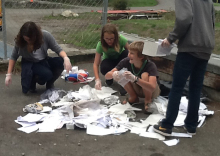Orcas 8th Graders Dissect Island Recycling; Findings are Disappointing
— from Orcas Recycling Services —
 Orcas Islanders are not doing a very good job recycling. That’s what Laura Tidwell’s 8th grade science class found out when they looked into the recycling at the Orcas Transfer Station in early October.
Orcas Islanders are not doing a very good job recycling. That’s what Laura Tidwell’s 8th grade science class found out when they looked into the recycling at the Orcas Transfer Station in early October.
“It was disgusting,” said 13-year old Millie Kau. “We couldn’t believe how dirty the recycling was.”
Exchange/ORS staff pulled eight random bags of recycling out of the blue 40-yard steel bins at the transfer station. The students, working in teams, dissected each bag, separating the clean recyclables from contaminated material and plain-old garbage.
Everyone (including The Exchange/ORS staff) was surprised at what they discovered.
“The kids found that only about 40 percent of the material in the bags was actually clean recyclable material,” said Tidwell. “The rest was badly contaminated or non-recyclable.”
The biggest problem was food contamination, according to the kids. Bottles cans and plastic containers with significant amounts of food and mold were found. Also paper products with food residue were common. These contaminated materials are not recyclable.
While a few bags were very clean, most were not, and some were terrible—filled with mostly garbage.
“I am actually kind of horrified,” said Exchange/ORS director Pete Moe. “We’ve had complaints from the facility on the mainland that processes our recycling, but I didn’t think it was this bad. We have some education to do.”
 Moe pointed to contaminated recycling as one of the reasons The Exchange/ORS board is convinced that Orcas needs to move back to the source-separation model of recycling that existed on Orcas more than a decade ago.
Moe pointed to contaminated recycling as one of the reasons The Exchange/ORS board is convinced that Orcas needs to move back to the source-separation model of recycling that existed on Orcas more than a decade ago.
“Dirty recycling just becomes garbage,” Moe said. “It’s more expensive to process. In the end we will all just end up paying more.”
“People have to do a better job of washing out there recycling,” said 8th grader Luke Peistch.
The staff also pointed out that it’s easy to find out how to recycle correctly at www.exchangeorcas.org, where anyone can download a comprehensive recycling guide.
The visit from the 8th graders to the transfer station is part of a larger cooperative program between The Exchange/ORS and the Orcas Island School District. “I really enjoyed working with my hands and sorting garbage,” said 8th grader Joe Reigel. “It was a blast!”
Tidwell’s class will be helping with an education program both in the school and for the general public. Specifically they will work on a marketing campaign that will inform everyone about recycling clean, uncontaminated materials.
Julie Pinardi’s 8th grade “Circle Of Leaders” is looking at collecting aluminum containers on campus, and with Brett McFarland’s High School Environmental Club, getting involved in the “Washington Green Schools” program, which you can learn more about at www.wagreenschools.org.
_____________________________________________________________________________
The Exchange/Orcas Recycling Services is a community-driven non-profit committed to the sustainable, responsible management of Orcas Island’s waste stream. The Exchange/ORS has been operating the Orcas Island Transfer Station since September 2013. www.exchangeorcas.org
**If you are reading theOrcasonian for free, thank your fellow islanders. If you would like to support theOrcasonian CLICK HERE to set your modestly-priced, voluntary subscription. Otherwise, no worries; we’re happy to share with you.**









Awesome job by the 8th graders and Laura Tidwell.
I went to the webpage mentioned in the article: “The staff also pointed out that it’s easy to find out how to recycle correctly at http://www.exchangeorcas.org, where anyone can download a comprehensive recycling guide.”
Actually, it is not super-easy to find the “how to recycle” instructions that easily. You need to find the “Recycling” page. Then the “Co-mingling” tab. Then at the bottom of the “Co-mingling” page is another link to a pdf.
Once you open the pdf, you find the instructions about how and what to recycle. It’s a long list — but the ORS might consider putting this one essential piece of info from the pdf in bold, at the top of the Recylcing/Co-mingled page:
“Please rinse out any residue prior to recycling. Flatten all items as much as possible.”
Just a thought…
I contacted the exchange board soon after the takeover of new service…..with my concern about lack of knowledge about recycling. I live in an apt and use shared dumpsters. I am appalled at what goes into recycling bin. It is throughly disgusting and it is clear to me folks do not have proper information and they do not read signs on bin or instructions. seems to me a volunteer group needs to make visits, meet with tenants and or users of service and provide education.
I am pleased that such a sampling of what we recycle was studied by students. Involving youth in our social infrastructure is valuable education, for them and for us. Now, I will personally endeavor to do a better job at cleaning my recycling. Thank you!
Laura: Students love that “hands on” learning. But you and your students went over the top. Congratulations to you and your class for an interesting and apparently very much needed real-world learning experience. Thanks!
I stood at one of the trash receptacle locations at the Farmer’s market this summer, one for “Trash” and the other for “Recycle” and waited in a quandary with my own trash, wondering about which was considered which. Several people came up with their trash with the same question, agreeing with me, and each one made a different decisions about about what they though should go where. None of us knew for sure! The same thing has happened when I’ve volunteered to help in the kitchen at Orcas Center. I did manage to find the list from the ORS website. The list is long although specific, and not easy to remember. I have now posted it on my refrigerator at home, but I think it needs to be posted at every public place, and any place where many people use the same receptacles. THANK YOU TEACHERS AND STUDENTS
People who put trash into recycling bins, and who also drop in dirty recyclables, know very well what they’re doing. It’s cheaper to put stuff into recycling than into garbage, and nobody monitors their “contributions,” so they know that they can get away with it.
Publishing clearer instructions, or making the instructions easier to access, will not end the rampant abuse. Many abusers already know the rules, but willfully don’t abide by them.
The best solution I can think of is to go back to separated recycling, in which that which is dumped becomes much more visible. It won’t end the abuse, but it will make it more evident, and that will deter some of the abusers.
My strong and sincere thanks go to Laura and her class of hard-working research scientists, for exposing this, um, dirty secret.
As someone who has recycled for years, I’m always amazed when I see what people put into recycling bins in public places. Some people, I know, are genuinely confused, others just seem not to care or even notice that a receptacle is marked “Recycling”. And I think Steve Henigson is right that there will always be some people who cynically will put complete garbage into recycling to save a buck. But I think more education is needed, and returning to separated recycling would be a great move in the right direction.